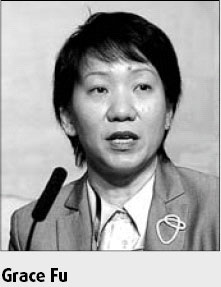Sino-Singaporean vision for blue skies and green grass
The Sino-Singaporean Eco-city project in Tianjin can serve as a reproducible model for other regions in China while greatly benefiting Tianjin in the next 30 to 40 years, a senior Singaporean official said.
"We have great expectations to turn the area into a most energy-conserving, harmonious and comfortable surrounding for working, living as well as leisure," said Grace Fu, Singapore's senior minister of State for National Development and Education.
The 30-sq km eco-city project will break ground in July and is scheduled to be completed in 10 to 15 years.

One third of the land to be used is salt pan, one third is deserted beach and one third is water.
"To build the eco-city in a harsh environment shows the ecological essence of the project, and we have to find the beauty of it," Fu told China Daily on sidelines of the ongoing 18th Asian Corporate Conference.
The urban development project is the second joint project by the two governments following the China-Suzhou Industrial Park in east China's Jiangsu province.
The official said the project will allow only non-polluting industries and require efficient wastewater disposal and plans urban forestation of up to 50 percent.
"If such ideas and methods can be accepted and duplicated by other provinces and cities, the project will be a total success," Fu said.
Officials from other provinces and municipalities have already come to study the project.
After a field inspection on Wednesday, Fu said she is impressed with the infrastructure construction of the Tianjin side.
"The project is undergoing rapid progress," Fu said. "The entire plan has fit together quite well and has been approved by both governments."
She further noted that Singapore and Tianjin could be complementary in sustainable development as Tianjin has potential in geothermal heat and wind power that Singapore does not possess, while Singapore has successful experience in transportation management, disposal of polluted water, urban forestation and greening as well as city planning and environment protection.
"We hope to translate all the concepts into Tianjin's future development."
Echoing Fu's expectations, Tianjin Mayor Huang Xingguo said the city has adopted many regulations in recent years to reduce industrial energy consumption and waste discharge, though there was still much distance from developed countries.
"Tianjin is always dedicated to absorbing international experience to achieve the goal of sustainable development so that we can have more azure sky, greener land and clearer water after some years," Huang told the conference.
(China Daily 05/30/2008 page22)














